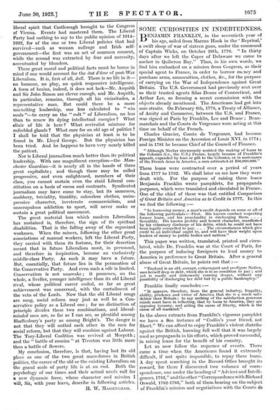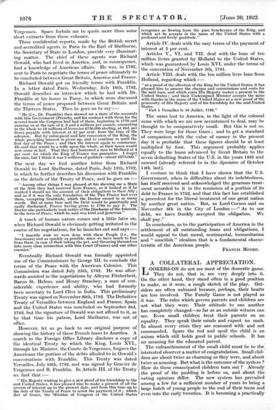SOME CURIOSITIES IN INDEBTEDNESS.
BENJAMIN" FRANKLIN, in the seventieth year of his age, sailed from Marcus Hook in the Reprisal,' a swift sloop of war of sixteen guns, under the command of Captain Wicks, on October 28th, 1776. " In thirty days after we left the Capes of Delaware we came to anchor in Quiberon Bay." Thus, in his own words, we find him embarked on a mission from Congress, as their special agent to France, in order to borrow money and purchase arms, ammunition, clothes, &c., for the purpose of carrying on the War of Independence against Great Britain. The U.S. Government had previously sent over as their trusted agents Silas Deane of Connecticut, and Arthur Lee, so forming a secret commission with the objects already mentioned. The Americans had got into sore straits. On February 6th, 1778, a Treaty of Alliance, of Amity and Commerce, between the U.S. and France, was signed at Paris by Franklin, Lee and Deane ; Beau- marchais and the Comte de Vergennes were acting at this time on behalf of the French.
Charles Gravier, Comte de Vergennes, had become Foreign Minister on the Accession of Louis XVI. in 1774 ; and in 1781 he became Chief of the Council of Finance.
" Although Necker strenuously resisted the making of loans to the Colonies (i.e., the U.S.) France, largely because of Franklin's appeals, expended by loan or gift to the. Colonies, or in sustenance of the French Arms m America, a sum estimated at $00,000,000."
These loans were contracted over a period of years from 1777 to 1782. We shall later on see how they were dealt with. For the purpose of raising these loans Benjamin Franklin wrote pamphlets, for propaganda purposes, which were translated and circulated in France. One of the chief of these was that entitled Comparison of Great Britain and America as to Credit in 1777. In this we find the following :— " In borrowing money, a man's credit depends on some or all of the following particulars :—First. His known conduct respecting former loans, and his punctuality in discharging them Seventhly. His known probity and honest character, manifested by his voluntary discharge of his debts, which he could not have been legally compelled to pay. . . . The circumstances which give credit to an individual ought to, and will have their weight upon lenders of money to public bodies and nations."
This paper was written, translated, printed and circu- lated, while Dr. Franklin was at the Court of Paris, for the purpose of inducing foreigners to lend money to America in preference to Great Britain. After a general abuse of Great Britain, he points out that :— " England is an old, corrupt, extravagant and profligate Nation, sees herself deep in debt, which she is in no condition to pay ; and yet is madly and dishonestly running deeper, without any possibility of discharging her debt but by a public bankruptcy."
Franklin finally concludes :- " It appears, therefore, from the general industry, frugality, ability, prudence and virtue of America that she is a much safer debtor than Britain ; to say nothing of the satisfaction generous minds must have in reflecting, that by loans to America, they are opposing tyranny, and aiding the cause of liberty, which is the cause of all mankind."
In the above extracts from Franklin's vigorous pamphlet we have a fine instance of " Codlin's your friend, not Short." We can afford to enjoy Franklin's violent diatribe against the British, knowing full well that it was largely used as propaganda in his efforts, which proved successful, in raising loans for the benefit of his country.
Let us now follow the sequence of events. There' came a time when the Americans found it extremely difficult, if not quite impossible, to repay these loans. A day spent searching in the Record Office brought its reward, for there I discovered two volumes of corre- spondence, one under the heading of " Advices and Intelli- gences, 1782," and the other " Correspondence with Richard Oswald, 1782-1788," both of them bearing on the subject of Franklin's mission and negotiations with the Comte de Vergennes. Space forbids me to quote more than some short extracts from these volumes.
These confidential reports, made by the British secret and accredited agents in Paris to the Earl of Shelburne, the Secretary of State in London, provide very illuminat- ing matter. The chief of these agents was Richard Oswald, who had lived in America, and, in consequence, had a knowledge of American' affairs. He was, in 1782, sent to Paris to negotiate the terms of peace ultimately to be concluded between Great Britain, America and France.
Richard Oswald got on friendly terms with Franklin. In a letter dated Paris, Wednesday, July 10th, 1782, Oswald describes an interview which he had with Dr. Franklin at his house in Passy, in which were discussed the terms of peace proposed between Great Britain and the Thirteen States. Then he goes on to say :- " He (i.e., Dr. Franklin) then showed me a state of the accounts with this avernment (French), and his contract with them for the several loans the Congress had had of them, beginning in 1778 and running on at the rate of 2, 3 and 4 millions per annum, amounting in the whole to 18 millions of livres (or £750,000 sterling, at 10d. per livre) payable with interest at £5 per cent. from the time of the advance. But by subsequent and late concession of the King, the whole preceding interest is given up, and to continue so until the first day of the Peace ; and then the interest again to commence. He said that would be a trifle upon the whole, as their taxes would now come in fast. That they had borrowed a sum in Holland at 4 per cent. for which the King of France was guarantee. I forget the sum, but I think it was 3 millions of guilders—about £275,000."
The next day we find another letter from Richard Oswald to Lord Shelburne, dated Paris, July 11th, 1782, in which he further describes his discussion with Franklin on the details of the Treaty of Peace, and he goes on :- " Among other things I was pleased at his chewing me a State of the Aids they had received from France, as it looked as if he wanted I should see the amount of their obligations to their Ally ; and as if it was the only foundation of the Ties France had over them, excepting Gratitude, which the Doctor owned in so many words. But at same time said the Debt would be punctually and easily disaiarged, France having given to 1788 to pay it. The Doctor also particularly took notice ofthe Discharge of the Interest; to the term of Peace, which he said was kind and generous." .
A touch of human nature comes out a little later on, when Richard Oswald is obviously getting irritated in the course of his negotiations, for he launches out and says :— " I heartily wish we were done with these People (i.e., the Americans) and as quickly as possible, since we have much to fear from them, in case of their taking the pet, and throwing themselves into more close connection with this Court (France) and our other enemies."
Eventually Richard Oswald was formally appointed one of the Commissioners by George III. to conclude the terms of the Peace with the American Colonies. This Commission was dated July 25th, 1782. He was after- wards assisted in the negotiations by Alleyne Fitzherbert, Baron St. Helens, and Henry Strachey, a man of con- siderable experience and ability, who had formerly been secretary to Lord Clive in India. This preliminary Treaty was signed on November 30th, 1782. The Definitive Treaty of Versailles between England and France, Spain and the United States was concluded on September 8rd, 1783, but the signature of Oswald was not affixed to it, as by that time his patron, Lord Shelburne, was out of office.
However, let us go back to our original purpose of showing the history of these French loans to America. A search in the Foreign Office Library discloses a copy of the identical Treaty by which the King, Louis XVI., through his Minister, the Comte de Vergennes, forgave the Americans the portion of the debts alluded to in Oswald's conversations with Franklin. This Treaty was dated Versailles, July 16th, 1782, and was signed by Clavier de Vergennes and B. Franklin. In Article III. of the Treaty we find that :- " His Majesty wishing to give a new proof of his friendship to the said United States, it has pleased him to make a present of all the arrears of interest up to the present date, and from this time up to the date of the Treaty of Peace to remit the payment of it ; which Act of Grace, the Minister of Congress of the United States
recognises as flowing from the pure beneficence of the King, and which act he accepts in the name of the United States with a profound and lively gratitude."
Article IV. deals with the easy terms of the payment of interest at .5 per cent.
Articles V., VI. and VII. deal with the loan of ten million livres granted by Holland to the United States, Which was guaranteed by Louis XVI. under the terms of the convention of November 5th, 1781.
Article VIII. deals with the ten million livre loan from Holland, regarding which :— " as a proof of the affection of the King for the United States, it has pleased him to assume the charges and commissions and costs for the said loan, and which costs His Majesty makes a present to the United States ; and their Undersigned Minister accepts the same with thanks in the name of the United States as a new proof of the generosity of His Majesty and of his friendship for the said United States.
" Fait a Versailles le 10 Juillet, 1782."
The sums lent to America, in the light of the colossal sums with which we are now accustomed to deal, may be thought to be comparatively small. But this is not so. They were large for those times ; and to get a standard of comparison with the value of money in the present day it is probable that these figures should be at least multiplied by four. This argument probably applies equally to the loans advanced by Great Britain to the seven defaulting States of the U.S. in the years 1831 and onward (already referred to in the Spectator of October 14th last).
I venture to think that I have shown that the U.S. Government, when in difficulties about its indebtedness, has itself received. and acknowledged the generous treat- ment accorded to it in the remission of a portion of its debt to France in 1782, and that this fact has established a precedent for the liberal treatment of one great nation by another great nation. • But, as Lord Curzon said on November 8th in the City of London :—" As to our debt, we have frankly accepted the obligation. We shall pay."
In conclusion, as to the participation of America in the settlement of all outstanding loans and obligations, I would appeal to that moral, sentimental, humanitarian and " unselfish " idealism that is a fundamental charac- teristic of the American people.
FRANCIS MOORE.











































 Previous page
Previous page